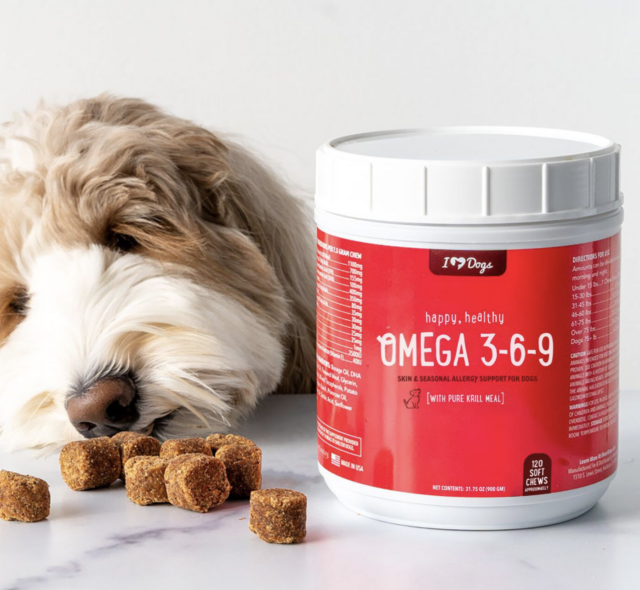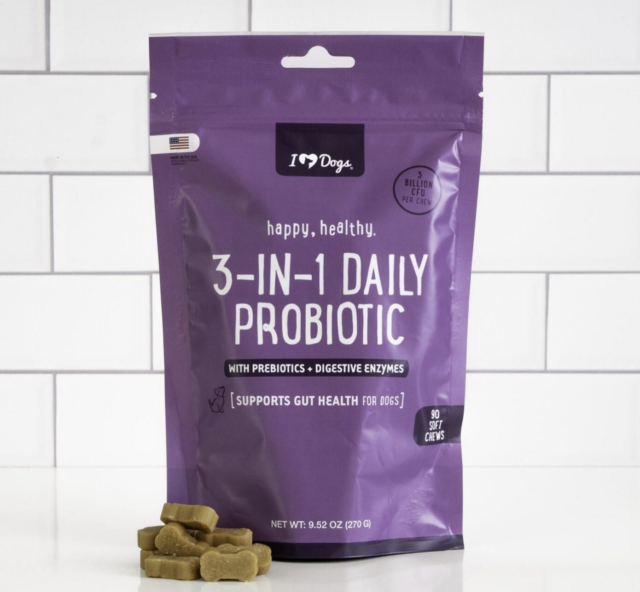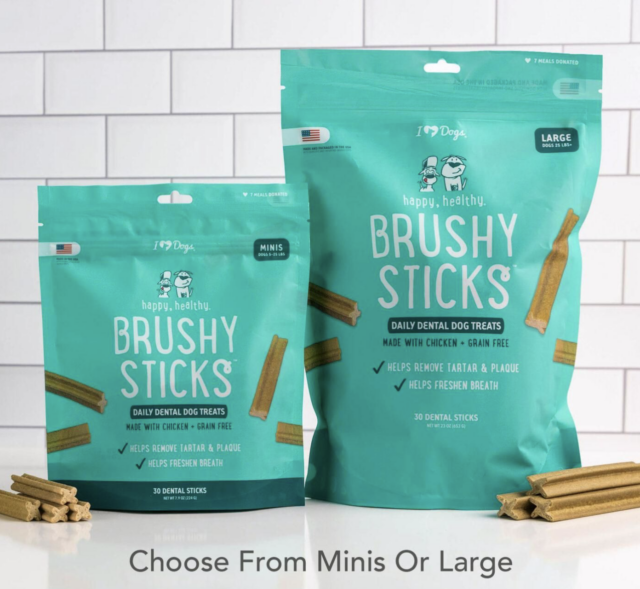iHeartDogs is reader-supported. When you buy via links on our site, we may earn an affiliate commission at no extra cost to you.
The health of our loved ones is one of the most precious things in life, which is why supplements for puppies are crucial. Supplements can help dog parents prioritize the well-being of their adoring puppies, who are totally dependent on them.
A significant part of a puppy’s health depends on what you put in their tummies. In addition to healthy dog food, essential supplements for your furry friend can have life-changing effects. They can enhance growth, protect against diseases, and improve cognitive ability.
Puppy supplements can be a crucial factor when it comes to your pup’s future.

“But Why Use Supplements When Using Healthy Dog Food?”
Any nutritional deficiency can harm your puppy’s health. Unless you’re feeding them the highest quality dog food, they’re likely missing out on essential nutrients for their growth.
Even if your puppy is getting the most well-researched food, they may still benefit from a supplement, depending on their health and breed. However, excessive amounts of nutrients can deteriorate your dog’s health, doing more harm than good.
Hence, it’s vital to choose a proper supplement for your growing puppy. Lucky for you, we have researched a variety of the best supplements for puppies on the market. Each one serves a different purpose.
Buyer’s Guide: Supplements for Puppies
There are lots of supplements that puppies can have, so here are some aspects to consider before choosing one. Before adding one to your pup’s diet, it’s a good idea to talk to your vet.
Purpose
First, decide what your puppy needs a supplement for. Supplements can provide a variety of benefits, such as keeping coats shiny, improving digestion, or promoting cognitive development. Find one that focuses on what your furry friend needs most.
Ingredients
High-quality ingredients are crucial. Look for natural ingredients and avoid supplements with artificial additives or fillers. Keep an eye out for nutrients like probiotics, omega fatty acids, and calcium since those are known for being beneficial to puppies.
Type
Not all supplements are served the same. They can come as soft chews, powder, liquid, or pills. If your dog will eat anything, the type of supplement might not matter, but soft chews are typically the easiest to administer.
Flavor
For picky pups, it can help if the supplement is a flavor they enjoy. Many dog supplements look and smell like treats so your dog won’t know they’re eating something healthy.
Effectiveness
Of course, you’ll want a supplement that effectively does what it’s supposed to. Look at reviews to see other pet parents’ experiences, and ask your vet for recommendations.
What are the 4 Best Supplements for Puppies?
1. Omega-3 Fatty Acids
Your puppy is still in their learning and development phase. They’re likely in training, which is as much of a mental process as a physical one. You’re likely keeping their needs in check, but are you sure they’re getting enough nutrients for proper cognitive development?
Omega-3 is a type of essential fatty acid (EFA) that’s extremely important for the cognitive development of puppies. Nearly half of the brain is made up of fat, and a significant percentage of that fat is docosahexaenoic acid (DHA), a type of omega-3 fatty acid.
Unfortunately, most dog foods don’t have enough omega-3s. A puppy’s body can’t produce omega fatty acids by itself, so it needs to get them from external sources. Thus, if there’s not enough in their food, it has to be provided as a high-quality supplement.
Overall, omega fatty acids can help with brain and eye development, heart health, inflammation, skin and coat, and energy.
iHeartDogs Omega 3-6-9 Chews
iHeartDogs Omega 3-6-9 is one of the best products on the market for essential fatty acids. It’s especially great for keeping your pup’s skin and coat healthy. Even if your puppy isn’t facing any issues, you can use it to ensure they get all the fatty acids they need.
These supplements contain two highly valuable types of omega-3: DHA and EPA. Those fatty acids help with the cognitive development of young dogs. Also, this is one of the only dog supplements that contains gamma-linolenic acid (GLA), a type of omega-6 that fights inflammation and improves the cognitive function of puppies. It also contains omega-9, which improves the immune system and cholesterol levels.
Benefits:
- Helps with a puppy’s brain development.
- Contains anti-inflammatory fatty acids to protect against arthritis and ease joint pain.
- Uses DHA to promote good eyesight.
- Improves immune systems.
- Enhances the condition of a puppy’s skin and coat.
- Boosts energy.

These are a few of the many health perks this product will bring to your puppy. However, it should be noted that fatty acids in high doses can have minor side effects, so be careful with the dose. When in doubt, ask a vet for their dosage recommendation.
Related: The 10 Best Fish Oil Supplements for Dogs
2. Probiotics
Probiotics are friendly bacteria and yeast that spend most of their life inside the gut, fighting off bad bacteria and improving the digestive system.
Humans, as well as dogs, need to have a balanced amount of good and bad bacteria to function properly. Unfortunately, bad bacteria sometimes outnumber good bacteria, causing health-related inconveniences. Some of the good bacteria in your puppy’s gut may die as a result.

In those situations, it’s important to give your puppy relevant doses of probiotics, so the number of good bacteria rises enough to neutralize the effects of bad bacteria. Probiotics should be a regular part of a diet because they help enhance digestion, improve mental health, and boost the immune system.
Why Not Use the Usual Food Items that Contain Probiotics?
There are many food items we consume daily that fulfill our needs for probiotics, and we can let our puppies consume most of them without running any health risks. However, dog-specific probiotics are much more beneficial for your pup. Not only do dog probiotics have additional advantages for puppies, but they’re also more effective.
iHeartDogs 3-in-1 Probiotic Dog Chews
There are many dog-specific probiotics on the market, but this is one of the best options for your puppy. These chews have all the previously discussed benefits, and they also contain prebiotics and digestive enzymes.
Prebiotics are food for good bacteria. They help the probiotics grow, so it’s wise to take them with probiotics. Digestive enzymes are the enzymes that aid in good digestion.
Having all three of those items in a single chew makes this product a lethal weapon against a long list of common digestive issues that might irritate your puppy.
Benefits:
- Boosts the immune system.
- Improves the health of the gastrointestinal tract (GI tract).
- Helps with better absorption of nutrients.
- Contains digestive enzymes.
- Reduce stress and anxiety.
- Contains prebiotics that enhance probiotics.
Related: 10 Best Dog Multivitamin Products

3. Dental Chews
Oral diseases are one of the most common health problems young dogs face. Bad habits such as not brushing their teeth can adversely affect their overall health. The problem may seem to only affect teeth, but it can also have a deteriorating effect on vital organs such as the liver and kidneys.
Healthy oral habits can prevent such complications. This starts with brushing your puppy’s teeth, but sometimes, teeth brushing can be difficult. If you struggle to maintain a good oral routine, a pack of dental chews can be a lifesaver.
Are Dental Chews as Good as Brushing?
Although dental chews are very effective for good oral health, nothing is as effective as brushing your dog’s teeth. However, for the days when puppies refuse to cooperate, having some sort of cleanup is a million times better than doing nothing.
While puppies dislike teeth brushing, they usually love dental chews. Most dogs would never say no to a nicely-flavored stick. However, not all chews are equally effective. Low-quality products might not work as well, so you should invest in top-notch chews.
iHeartDogs Brushy Sticks Dental Treats
This product comes as a pack of 30 sticks that will clean the tartar off your puppy’s teeth while also helping them have fresh breath all day long.
It’s especially good for puppies that have a complicated tooth structure and are difficult when getting their teeth brushed. It will also work for dogs who have grain allergies since it’s grain-free.
These chews clean teeth by brushing the plaque off as dogs gnaw on them, which prevents the tartar from slowly building up. Since tartar is the root of many oral health issues, taking steps to prevent it is essential.
Benefits:
- Grain-free to protect puppies with allergies.
- Made with real chicken.
- Leaves your pup with minty-fresh breath.
- Prevents tartar by not allowing plaque to build up.
- Makes cleaning your dog’s teeth easy.
4. Protein Boosters
Proteins are a necessary part of a well-balanced diet for younger dogs, just like they are for humans. Puppies need them for their growing muscles and bones, and for various other biological components and functions.
Your puppy is not able to retain proteins for a long time, so they need to be fed protein regularly. While you can use everyday food items that are high in protein to fulfill your puppy’s requirements, it’s easier to use a high-quality supplement.
A protein supplement will help you track how much protein you’re putting into your dog’s system and reduce the risk of feeding them too much.
iHeartDogs Nutrition Boost Beef Food Topper
This food topper will add high-value ingredients to your regular dog food by introducing proteins, probiotics, and antioxidants. Its flavor can also make meals more appealing to picky pups.
Often, cooking burns the necessary nutrients in dog food, which may also contain essential proteins. By introducing this topper to your dog’s diet, you will make sure that your puppy is not missing out on proteins.
Since the topper contains probiotics, it’s a good defender against miserable digestive problems. If your dog is eating this topper, they may not need a probiotic supplement.
Benefits:
- Improves the immune system.
- Contains protein that helps with tissue development and repairs broken tissues.
- Contains protein that helps make antibodies, enzymes, and hormones.
- Makes meals more appealing to puppies.
- Contains probiotics that promote a healthy gut.

Bonus: Supplements to avoid
All the above are essential supplements that can drastically improve your puppy’s life if used properly. However, not every supplement on the market is needed. Certain ones are either useless or even harmful to your puppy, such as the following.
Vitamins and Multivitamins
Usually, a puppy should be getting all the vitamins they need from a balanced diet, so providing multivitamins isn’t necessary. The following may even harm your pup.
Multivitamins Made for Humans
If you feel that your puppy requires multivitamin supplements, never give them multivitamins made for human use. A human tablet may contain a higher dose of vitamins than dogs need, and it may cause mild to severe complications for the puppy. It may also include ingredients that aren’t pet-friendly.
Vitamin D and Prenatal Vitamins
Some multivitamins are highly toxic to dogs, such as prenatal vitamins. Prenatal vitamins contain high amounts of iron, potentially causing iron toxicity in puppies.
Also, high levels of vitamin D can cause serious harm to your puppy. It can even cause permanent organ damage.
Caffeine
Never let your puppy consume caffeine. Don’t even let them get close to it. It’s toxic for them and may even result in life-threatening medical conditions. Caffeine consumption may increase body temperature, cause seizures, and lead to cardiac arrhythmia.
So, be extra careful when it comes to caffeine. For us, caffeine is a life-saving drug that has gotten us through the most stressful situations, but for our dogs, it’s too dangerous.

Xylitol
Xylitol is a very common artificial sweetener that’s safe for human consumption. However, it can be lethal for dogs. It can cause deteriorating effects on a dog’s health, even if consumed in small amounts. Xylitol may even cause an unfortunate death of a puppy.
So, any supplement that contains even a trace of xylitol should be avoided at all costs.
Frequently Asked Questions
Do Puppies Need Supplements?
Whether or not a puppy needs supplements largely depends on their diet and overall health. If they’re eating a balanced diet that’s vet-approved and suitable for their breed and age, they might not need supplements. However, certain conditions, deficiencies, or specific needs (such as breed-specific needs) may require additional supplements. Ask your veterinarian for best advice.
Are Supplements Safe for Puppies?
Yes, supplements can be safe for puppies when used correctly and under the guidance of a veterinarian. However, you should avoid giving your puppy too much of one supplement because that could do more harm than good.
At What Age Should You Start Giving a Puppy Supplements?
There’s no specific age when all puppies should start taking supplements, as the need for supplementation largely depends on the individual puppy’s diet, health status, and breed-specific requirements. It’s best to consult with a veterinarian who can assess your puppy’s health and nutritional needs to determine if and when a supplement should be started.
What Side Effects Can Puppy Supplements Cause?
While most puppies tolerate supplements well, some may experience mild side effects such as gastrointestinal upset, including diarrhea or vomiting. Over-supplementation, especially with certain vitamins and minerals, can potentially lead to more serious health issues like vitamin toxicity, so it’s important to follow dosage instructions and consult with a vet.
How Long Does it Take to See Results with a Puppy Supplement?
The length of time it takes to see results from a puppy supplement can vary widely based on the type of supplement and the specific health concern it’s addressing. Some improvements, like better digestion from probiotics, might be noticeable within a few days or weeks, while other benefits, like joint health improvement from glucosamine, might take several weeks or even months to become apparent.
Can Puppies Take Human Supplements?
No, puppies should not take human supplements. The dosages and ingredients in human supplements may not be safe or suitable for puppies, and some could contain substances that are harmful or even toxic to dogs. Always use products that are specifically designed for dogs and consult with a vet.
Conclusion
There are certain supplements you may give to your puppy for a healthy lifestyle. Omega fatty acids are great for the brain, vision, skin, and coat. Prebiotics and probiotics are excellent for the gut. They can help your puppy avoid uncomfortable digestive problems.
Also, dental chews will help prevent tartar from accumulating on your puppy’s teeth. They can play a key role in achieving good oral health. Then, the protein topper will help with healthy growth, boost the immune system, and make food easier to eat.
Finally, as important as supplements are, you should be cautious with the supplements you choose. Certain supplements can be toxic and can even result in life-threatening conditions.
A healthy lifestyle starts with a healthy diet. Considering the best supplements for puppies can improve your dog’s quality of life for years to come.
Dog Product Reviews






 Toledo, United States.
Toledo, United States.